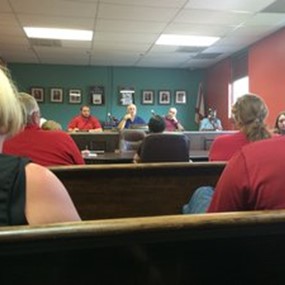Roanoke Church Has Storied Past, Bright Future
Established in 1845, First Baptist Church has enjoyed a long history in Roanoke, Alabama. Construction of the original building on Main Street began in 1901, and its current building has occupied its location in the heart of downtown Roanoke since 1979.
It was this history that caught my eye as a newcomer. As I walked up the manicured lawn on my first Sunday in Roanoke, the historical marker posted in the front lawn grabbed my attention, as did the building’s cornerstone from the turn-of-the-century. Walking through neo-Byzantine arches as I entered the red-brick building, I was further impressed in the sanctuary with a sense of the church’s reverence for its traditions and history.
My own church experiences have usually been much different. Though a Christian, I have never consistently attended a traditional Baptist church, having attended contemporary Presbyterian, nondenominational, and Methodist churches instead.
At first, I was not quite sure what to make of these differences. Where I was used to wooden chairs or benches, First Baptist has red velvet pews with flowered, scrolling details on their wooden sides. Instead of a band leading worship with contemporary songs, a six-person choir and a worship director with a beautiful tenor led us in a series of hymns, accompanied by a large pipe organ that flanked the pulpit on either side. Instead of simple, clear glass windows, sunlight streamed through primary-colored stained glass featuring biblical imagery.
I thoroughly enjoyed the traditional elements of worship that day, just as I enjoyed the sermon from Reverend Ben Bailie on Mark 5:1-20. My favorite part of First Baptist, however, came when the service ended and its congregants visited together. The members of First Baptist greeted me warmly and welcomed me to their church.
In these conversations, the affectionate bonds between the members of the congregation were obvious. In a lunch at the local meat-and-three after the service, several ladies discussed with me the depth of their bonds with each other and with First Baptist. Indeed, the most recent transplant to Roanoke and to First Baptist had ‘only’ been there for 50 years. Though smaller in terms of numbers (there were 46 members present on the Sunday that I attended), the wealth of friendships and history among its congregation made the church feel as open and vital as any church I have attended.
As with many towns in the South, the Baptists and the Methodists are the two largest denominations in Roanoke. However, rather than being a matter of discord between the two churches, First Baptist and First Methodist, which face each other diagonally on Main Street, have frequently united in the name of intra-denominational cooperation.
When First Baptist’s building burned in 1977, First Methodist hosted the congregation in its building, and the two churches alternated using the sanctuary while the other attended Sunday School in an adjoining structure to accommodate the two congregations. Joy Adams, a retired school teacher of math and reading, remembers other instances of cooperation between the two churches, saying, “When we had a fifth Sunday in a particular month—and this was usually when one of us had an interim pastor—we’d meet at the Methodist church and their pastor would preach, and the next time, they’d come to the Baptist church and ours would preach.”
Adams has deep roots with the denomination and has attended First Baptist since she and her husband first moved to Roanoke in January 1953. “I grew up at a First Baptist Church [in Georgia], I went to First Baptist in Lanett [Alabama], and I’ve never thought of going anywhere else,” she said. She added that the most special thing about the church were the friendships that she’d made over the years.
A post-industrial town, Roanoke’s population has decreased over the years as some of its manufacturing industries have moved or ceased production, and citizens migrated elsewhere to find work. First Baptist’s attendance has decreased with these changes, but Adams is optimistic about the church’s role in Roanoke’s future, saying, “I have no idea what the future holds, but I think as long as First Baptist is in Roanoke it will be working for the community.”
Tags: Roanoke
